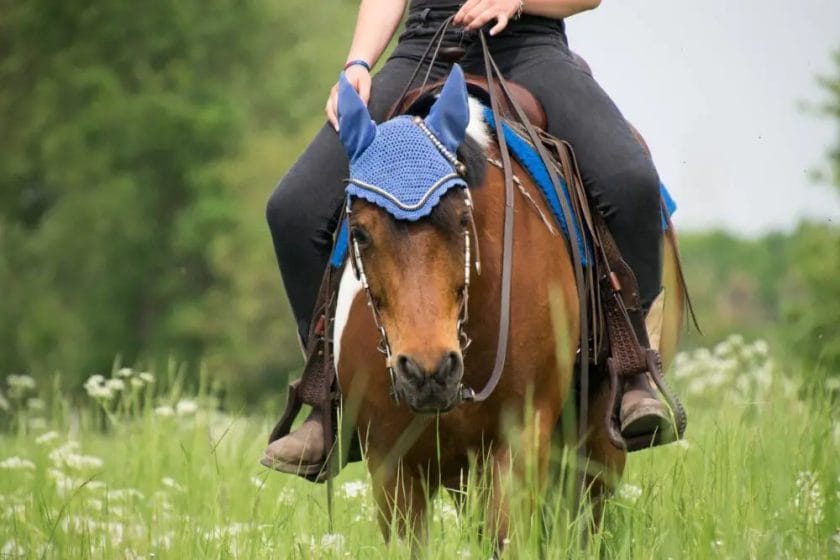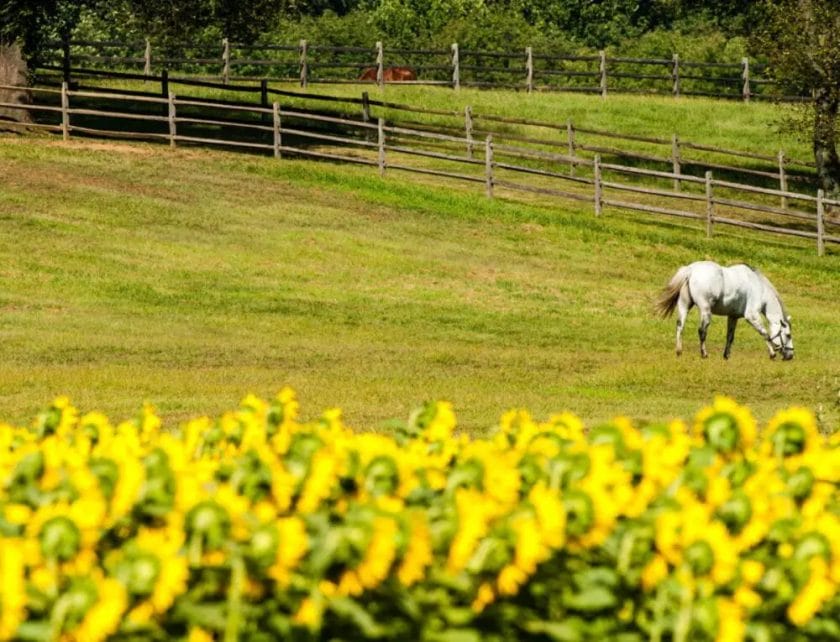Dealing with summer sores in horses can be a challenge, but with the right treatment, these pesky issues can be resolved quickly. Summer sores, also known as habronemiasis, are caused by worm larvae and can result in painful and irritating sores on a horse’s skin.
One effective way to treat summer sores is by using deworming medications that target the larvae. Additionally, keeping the affected area clean and dry can help prevent further irritation and promote healing. It’s important to consult with a veterinarian to determine the best course of action for your horse’s specific needs.

Identifying Symptoms of Summer Sores in Horses
Horses are magnificent creatures known for their strength and agility. However, just like any other living being, they are susceptible to various health conditions. One common ailment that horses may experience during the summer months is summer sores. These sores are caused by the larvae of certain species of flies that infest the skin, typically around a wound or cut. It is essential for horse owners and caretakers to be able to identify the symptoms of summer sores to provide prompt and appropriate treatment.
The first symptom of summer sores in horses is the formation of a small, reddish bump or lesion on the skin. This bump may appear swollen and can be itchy or painful for the horse. As the larvae continue to develop, the sore may increase in size and become more pronounced. It is crucial to monitor any unusual bumps or lesions on your horse’s skin, especially if they do not heal or show signs of improvement over time.
Another common symptom of summer sores is the presence of excessive granulation tissue around the lesion. Granulation tissue refers to the pinkish fleshy growth that forms during the healing process of a wound. In the case of summer sores, the presence of excessive granulation tissue indicates an overactive immune response to the larvae. This tissue can cause discomfort and may even bleed or become infected if not properly managed.
In some cases, horses with summer sores may display signs of localized inflammation. This can manifest as redness, heat, and swelling around the affected area. The horse may exhibit signs of pain, such as lameness or reluctance to move, particularly if the summer sore is located on a limb or joint. It is crucial to observe any changes in your horse’s behavior or mobility, as they can provide valuable insights into the severity of the condition.
Additionally, horses with summer sores may experience persistent itching or discomfort in the affected area. They may rub or scratch against objects to alleviate the itchiness, which can further irritate the skin and potentially lead to secondary infections. If you notice your horse excessively scratching or rubbing a specific area, it is essential to investigate further and determine if a summer sore is the underlying cause.
Furthermore, it is worth noting that summer sores can occur in various locations on a horse’s body. While they commonly develop around wounds or areas with previous skin damage, such as cuts, scrapes, or insect bites, they can also emerge in seemingly healthy skin. These sores may appear anywhere, including the limbs, face, neck, or body. It is crucial to conduct regular inspections of your horse’s skin to identify any potential summer sores, particularly during the warmer months when flies are more active.
In summary, summer sores in horses can be identified by the presence of small, reddish bumps or lesions on the skin, excessive granulation tissue, localized inflammation, and persistent itching or discomfort. It is vital for horse owners and caretakers to remain vigilant and promptly address any signs of summer sores to prevent further complications. If you suspect that your horse may have summer sores, consult with a veterinarian for a proper diagnosis and appropriate treatment.

Effective Topical Treatments for Summer Sores in Horses
Summer sores, also known as cutaneous habronemiasis, can be a frustrating and painful condition for horses during the summer months. These sores are caused by the larvae of stomach worms that live in the digestive system of the horse. The larvae are typically passed out with manure and can cause infection in any open wound or moist area on the horse’s body, such as the eyes, mouth, or genital area.
1. Fly Control
The first step in treating summer sores is to establish a good fly control program. Flies are not only responsible for spreading the larvae but also irritate the wounds, making the condition worse. Use fly repellents, fly sheets, and fly masks to minimize the horse’s exposure to flies. Additionally, keeping the horse’s living area clean and free from manure can help reduce the fly population.
2. Cleaning and Dressing the Wounds
Before applying any topical treatments, it is essential to clean and dress the wounds properly. Use a mild antiseptic solution or saline to cleanse the affected area. Gently remove any debris or crusts that may have formed. After cleaning, apply a non-stick wound dressing to protect the wound and provide a barrier against further contamination.
3. Ivermectin-Based Cream or Gel
Ivermectin-based creams or gels are commonly used to treat summer sores. Ivermectin is an anthelmintic that kills parasites, including the larvae responsible for the sores. Apply the cream or gel directly to the affected area, ensuring thorough coverage. It is essential to follow the manufacturer’s instructions for dosage and frequency of application.
4. Antibacterial or Antifungal Creams
In some cases, summer sores may become infected with bacteria or fungi, leading to further complications. In such instances, the use of antibacterial or antifungal creams can help combat the infection. These creams contain ingredients that kill or inhibit the growth of bacteria and fungi. Apply the cream directly to the wound, following the recommended dosage and frequency.
5. Medicated Fly Repellent Creams
Medicated fly repellent creams can provide dual benefits by repelling flies and treating summer sores at the same time. These creams typically contain ingredients like pyrethrins or permethrin, which repel flies, mosquitoes, and other insects. Simultaneously, they may also have antibacterial or antifungal properties to aid in the healing process. Apply the cream to the affected area and reapply as necessary, following the manufacturer’s instructions.
6. Consultation with a Veterinarian
In severe cases or if the sores do not respond to topical treatments, it is crucial to consult a veterinarian. They can provide a thorough examination, prescribe appropriate medications, and recommend additional treatments if necessary. A veterinarian’s expertise is invaluable in managing and resolving summer sores in horses.
In summary, effective topical treatments for summer sores in horses involve a combination of fly control, wound cleaning and dressing, the use of ivermectin-based creams or gels, antibacterial or antifungal creams, medicated fly repellent creams, and consultation with a veterinarian if needed. By following these guidelines and providing proper care, you can help alleviate the discomfort and promote the healing of summer sores in your horse.

Natural Remedies for Treating Summer Sores in Horses
Summer sores are a common problem that can affect horses during the warmer months. These sores are caused by a type of parasitic worm, and they can be quite uncomfortable for the horse. While there are various conventional treatments available, many horse owners prefer to explore natural remedies to address this issue. In this section, we will discuss some effective natural remedies for treating summer sores in horses.
1. Neem Oil
Neem oil is derived from the neem tree and has powerful anti-inflammatory and antiseptic properties. It can be applied topically to the summer sores on your horse’s skin. Neem oil helps to reduce inflammation and prevent infection, promoting faster healing of the sores.
2. Aloe Vera Gel
Aloe vera gel is well-known for its soothing properties, and it can be a great natural remedy for summer sores in horses. Apply a thin layer of aloe vera gel directly to the affected areas of your horse’s skin. This will help to soothe the irritation and promote healing.
3. Tea Tree Oil
Tea tree oil is a popular natural remedy for various skin conditions, including summer sores. It has antimicrobial and anti-inflammatory properties that can help to reduce inflammation and prevent infection. Dilute tea tree oil with a carrier oil, such as coconut oil, and apply it topically to the sores.
4. Calendula Cream
Calendula cream is made from the flowers of the calendula plant and is known for its healing properties. Apply a thin layer of calendula cream to the summer sores on your horse’s skin. This will help to reduce inflammation, soothe the skin, and promote faster healing.
5. Apple Cider Vinegar
Apple cider vinegar is a versatile natural remedy that can be beneficial for treating summer sores in horses. Dilute apple cider vinegar with water and apply it to the affected areas using a clean cloth or sponge. This will help to cleanse the sores and prevent infection.
6. Herbal Remedies
There are various herbal remedies that can be used to support the healing process of summer sores in horses. Herbs such as chamomile, lavender, and witch hazel have soothing and antibacterial properties. You can make herbal infusions or use herbal essential oils diluted in a carrier oil to apply to the sores.
7. Proper Hygiene and Fly Control
Prevention is key when it comes to summer sores in horses. Maintaining proper hygiene and implementing effective fly control measures can help prevent these sores from occurring. Regularly clean your horse’s living area, remove manure promptly, and use fly repellents to minimize the risk of infestation and the subsequent development of summer sores.
In summary, summer sores in horses can be effectively treated using natural remedies. Neem oil, aloe vera gel, tea tree oil, calendula cream, apple cider vinegar, and herbal remedies can all contribute to the healing process. Additionally, practicing good hygiene and implementing fly control measures can help prevent the occurrence of summer sores in the first place. By exploring these natural remedies and taking preventive measures, you can ensure the well-being of your horse during the summer months.
Preventative measures to avoid summer sores in horses
Summer sores, also known as cutaneous habronemiasis, can be a pesky and painful condition that affects horses during the summer months. These sores are caused by the larvae of Habronema and Draschia worms, which are typically found in the digestive tract of horses. When flies deposit the larvae onto open wounds or moist areas of the horse’s skin, they can cause inflammation, itching, and the formation of sores. To prevent summer sores and protect the well-being of your horse, consider the following preventive measures:
1. Fly control
Implementing effective fly control measures is crucial in preventing summer sores. Flies are carriers of the Habronema and Draschia larvae, so reducing their population is essential. Start by regularly cleaning the horse’s living area, removing manure and wet bedding that can attract flies. Use fly traps, fly repellents, and fly sheets to provide additional protection. You can also consider using insecticides or fly predators to further minimize the fly population.
2. Wound management
Proper wound management plays a significant role in preventing summer sores. Promptly and effectively treating any cuts, abrasions, or open wounds on your horse’s skin can prevent the entry of larvae. Clean the wound thoroughly with an antiseptic solution and apply an appropriate dressing to keep it clean and protected. Regularly monitor the wound for signs of infection or fly eggs and consult your veterinarian if necessary.
3. Regular deworming
Deworming your horse regularly is essential to prevent and control the internal parasites that can cause summer sores. Consult with your veterinarian to develop a proper deworming schedule based on your horse’s individual needs and the local parasite population. Following a strategic deworming program will help minimize the risk of worm infestation and reduce the chances of larvae migrating to the skin.
4. Maintaining good hygiene
Keeping your horse’s living environment clean and hygienic can significantly reduce the likelihood of summer sores. Regularly remove manure, wet bedding, and any rotting organic matter from the stable or pasture. This will help eliminate breeding grounds for flies and reduce the overall risk of infection. Additionally, ensure that water troughs are cleaned regularly and provide your horse with access to clean, fresh water at all times.
5. Protecting vulnerable areas
Pay close attention to areas of your horse’s body that are more susceptible to summer sore development, such as the ears, sheath, and wounds. Use fly masks or ear nets to protect the ears from fly bites and larvae deposition. For horses with wounds or sensitive skin, consider using protective wraps or bandages to prevent flies from coming into contact with the affected areas. Implementing these additional protective measures can help minimize the risk of summer sore development.
In summary, preventing summer sores in horses requires a multi-faceted approach that includes effective fly control, proper wound management, regular deworming, maintaining good hygiene, and protecting vulnerable areas. By implementing these preventative measures, you can provide your horse with a safer and more comfortable environment during the summer months.
FAQs
1. How do I treat summer sores in horses?
To treat summer sores in horses, it is important to consult with a veterinarian for a proper diagnosis and treatment plan. Typically, treatment involves the use of topical medications such as antiparasitic creams or ointments. In some cases, oral medications may also be prescribed to address any underlying infections. Prompt and consistent treatment is crucial to prevent further complications.
2. Can I prevent summer sores in horses?
While it is not always possible to completely prevent summer sores, there are steps you can take to minimize the risk. Good fly control measures, such as using fly masks, fly sheets, and insect repellents, can help reduce the chances of horses getting infected. Regular cleaning of the environment, including manure removal, can also help reduce the fly population and minimize the risk of summer sores.
3. Are summer sores contagious to other horses?
Summer sores are not directly contagious between horses. They develop when flies transmit larvae into the wounds. However, it is essential to practice good hygiene and prevent the spread of flies to minimize the risk of other horses getting infected. Keeping infected horses separate and using fly control measures can help prevent the transmission of summer sores to other horses.
Conclusion
In conclusion, effectively treating summer sores in horses is crucial for maintaining their health and well-being. By understanding the causes and symptoms of these sores, horse owners can implement a comprehensive treatment plan. This may include cleaning and disinfecting the affected areas, removing any necrotic tissue, and administering appropriate medications such as antibiotics or dewormers. Regular veterinary check-ups and preventative measures, such as proper wound care and fly control, can also help prevent the occurrence of summer sores. By being proactive and diligent in their treatment approach, horse owners can ensure their equine companions stay healthy and free from the discomfort of summer sores.
